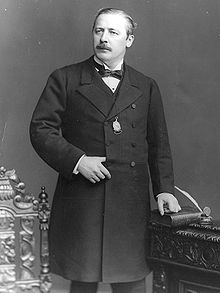The Earl of Cromer | |
|---|---|
 The Earl of Cromer in 1895 | |
| Consul-General of Egypt | |
| In office 11 September 1883 – 6 May 1907 | |
| Nominated by | William Ewart Gladstone |
| Appointed by | Victoria |
| Monarchs | |
| Preceded by |
|
| Succeeded by | Eldon Gorst |
| Controller-General in Egypt | |
| In office 1878–1879 | |
| Nominated by | Benjamin Disraeli, the Earl of Beaconsfield |
| Appointed by | Queen Victoria |
| Monarch | Isma'il Pasha |
| Preceded by | Office established |
| Succeeded by | Edward Baldwin Malet |
| Personal details | |
| Born | Evelyn Baring 26 February 1841 Cromer, Norfolk, England |
| Died | 29 January 1917 (aged 75) Westminster, London, England |
| Nationality | |
| Spouses |
|
| Children |
|
| Alma mater | |
| Occupation | Military officer, politician |
| Awards |
|
| Military service | |
| Allegiance | |
| Branch/service | Army |
| Years of service | 1860–1877 |
| Rank | Major |
| Unit | Royal Artillery |
Evelyn Baring, 1st Earl of Cromer, GCB, OM, GCMG, KCSI, CIE, PC, FRS (/ˈkroʊmər/; 26 February 1841 – 29 January 1917) was a British statesman, diplomat and colonial administrator. He served as the British controller-general in Egypt during 1879, part of the international control which oversaw Egyptian finances after the Egyptian bankruptcy of 1876. He later became the agent and consul-general in Egypt from 1883 to 1907 during the British occupation, prompted by the Urabi revolt. This position gave Baring de facto control over Egyptian finances and governance.
Baring's programmes led to limited economic development in Egypt in certain areas, but deepened its dependence on cash crops, as well as regressing some of its social developments (such as the state school system).[1]
- ^ Cleveland & Bunton 2009, p. 104.